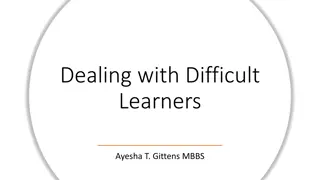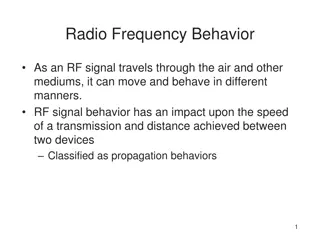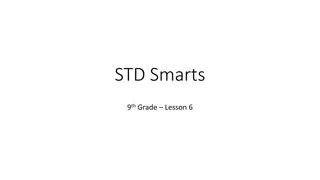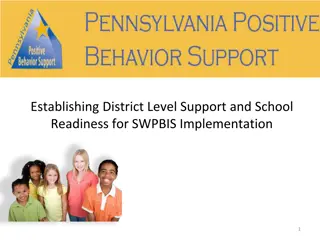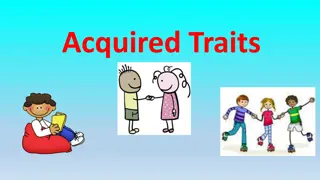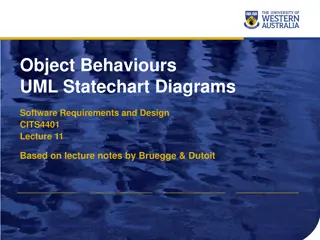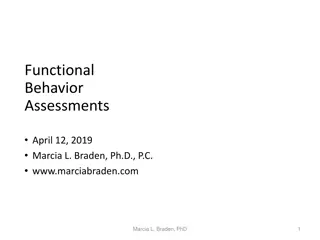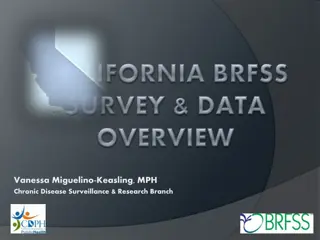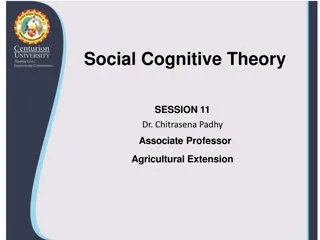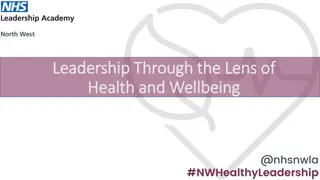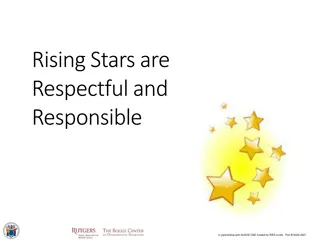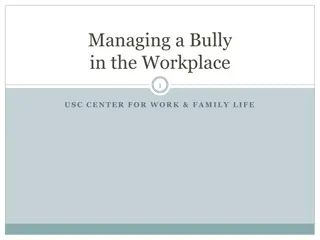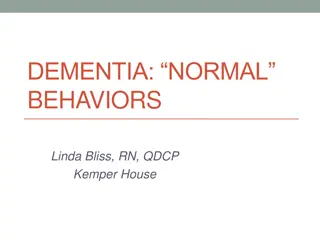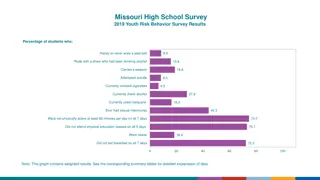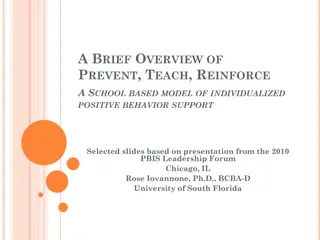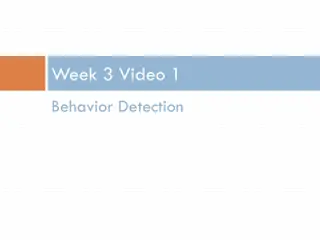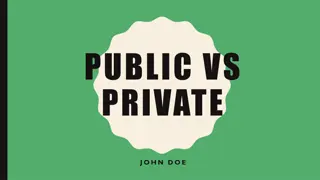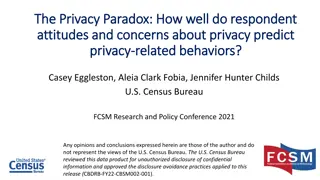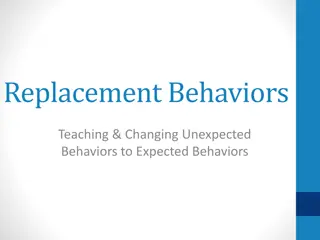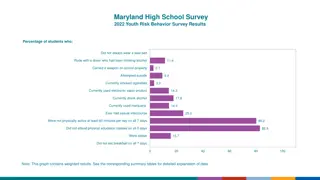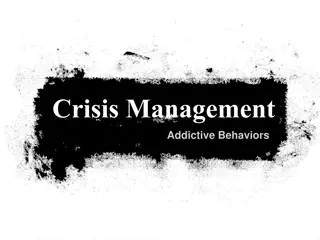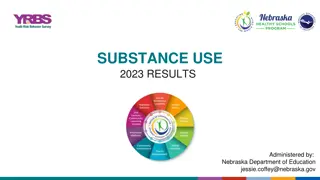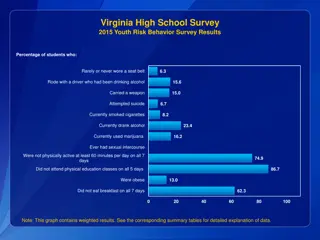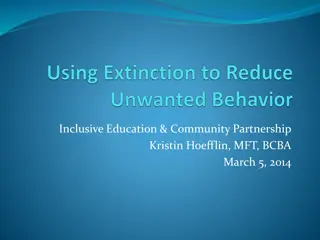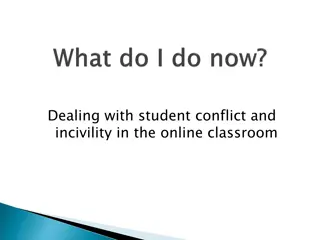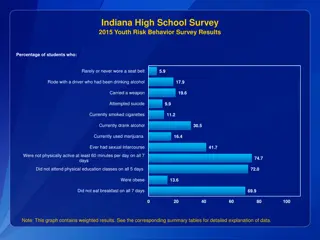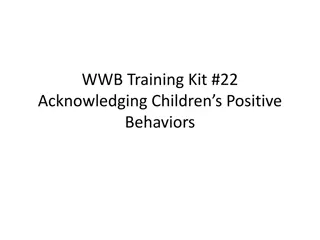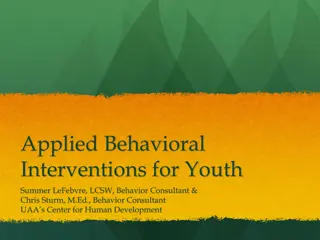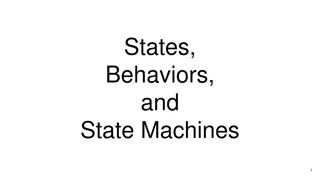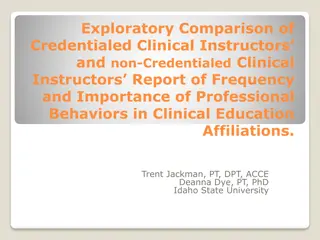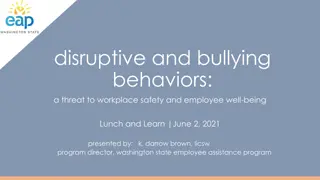Understanding and Managing Difficult Learner Behaviors in Adult Education
Dealing with difficult learners in adult education settings can impact the learning experience for all. This guide covers types of challenging behaviors, identifying underlying causes, and strategies for maintaining a constructive educational environment. By addressing disruptive behaviors effective
1 views • 32 slides
Understanding Changes in Domestic Abuse Practices Over the Last 2 Years
In the realm of domestic abuse and coercive control, there have been notable developments in practice over the past two years. From defining behaviors that constitute domestic abuse to recognizing economic abuse and the impact of coercive and controlling behaviors, the legal landscape has evolved to
6 views • 30 slides
Understanding Radio Frequency Behavior and Propagation Behaviors
Radio frequency signals exhibit various behaviors as they travel through different mediums, affecting transmission speed and distance between devices. Propagation behaviors include absorption, reflection, scattering, refraction, and diffraction, impacting wireless network performance. Understanding
2 views • 32 slides
STD Smarts 9th Grade Lesson: Risky Behaviors and STD Testing
In this 9th grade lesson on STD Smarts, students explore risky behaviors related to STD transmission and delve into the importance of STD testing. The lesson covers various scenarios and myths surrounding STDs, challenging students to consider their choices and knowledge about sexual health. Through
0 views • 32 slides
Understanding Sexual Violence and Harassment in Educational Settings
Sexual violence and harassment, including rape, sexual assault, and unwanted sexual behaviors, are serious issues that can affect anyone. This content highlights what sexual violence is, who can experience it, and the impact it has on students in educational environments. It also covers sexual haras
1 views • 27 slides
Wellness and Health Program Overview at Macalester College
Kelly Fang, the Co-Chair of WHAM at Macalester College, leads a comprehensive wellness and health program offering incentives for participants to improve their well-being. The program includes wellness rewards, health assessments, and data analysis on participant risk factors and health behaviors. P
0 views • 21 slides
Promoting Fetal & Maternal Health: Key Objectives & National Health Goals
This lecture by Assist. Prof. Dr. Hawraa Hussein Ghafel focuses on promoting fetal and maternal health through various aspects such as health behaviors, nursing processes, and health promotion during pregnancy. Key topics include identifying national health goals, assessing pregnant women, planning
0 views • 45 slides
SWPBIS Implementation: Establishing District Support and School Readiness
Positive Behavioral Interventions and Supports (PBIS) focuses on creating effective environments to encourage appropriate behaviors. SWPBIS extends this approach to whole schools, applying systemic strategies to achieve positive outcomes and prevent problem behaviors. It is not a quick fix or just a
2 views • 18 slides
Understanding Multiple Baseline Designs in Behavioral Experiments
Multiple Baseline Designs are a type of experimental design used in behavioral research. This design involves measuring two or more behaviors concurrently in a baseline condition, applying a treatment variable to one behavior at a time while maintaining baseline conditions for others, and then seque
0 views • 34 slides
Managing Difficult Employees and Disruptive Behaviors
Identify common types of difficult and disruptive employee behaviors, discuss the potential impact on the organization, and offer tips for constructive management in the workplace. Explore behaviors like gossiping, incivility, bullying, insubordination, and arrogance. Understand the metrics and lega
1 views • 20 slides
Understanding Acquired Traits and Learned Behaviors in Living Organisms
Acquired traits are physical characteristics acquired during a living thing's lifetime, such as scars, and are not passed down from parents. Many acquired traits are also learned behaviors, like reading or flying, which animals develop after birth. Learned behaviors, unlike inherited instincts, are
5 views • 15 slides
Understanding Object Behaviors and Statechart Diagrams in Software Design
Object behaviors and UML statechart diagrams play a crucial role in software requirements and design. State machines, transitions, events, and states are essential concepts in modeling object behavior in response to external events. By utilizing UML statechart diagrams, one can effectively represent
0 views • 23 slides
Understanding Functional Behavior Assessments for Supporting Students
Functional Behavior Assessments (FBAs) play a crucial role in supporting students with behavioral needs by identifying the reasons behind inappropriate behaviors. This approach, led by professionals like Marcia L. Braden, Ph.D., helps define interventions, prevent problems, and teach alternative beh
1 views • 51 slides
Overview of BRFSS Survey and its Core Components
The Behavioral Risk Factor Surveillance System (BRFSS) is a state-based telephone survey that monitors personal health behaviors in non-institutionalized adults. It collaborates with the CDC and all 50 U.S. states to gather data on various health topics. The survey includes fixed core questions on d
0 views • 18 slides
Understanding Social Cognitive Theory: Insights from Albert Bandura
Social Cognitive Theory, developed by Albert Bandura, emphasizes learning through observation and modeling behaviors. The theory explores how individuals acquire new behaviors, thoughts, and attitudes by observing others. Bandura's famous Bobo doll experiment showcased how children imitated aggressi
6 views • 17 slides
Exploring Leadership Through the Lens of Health and Wellbeing
This content delves into the importance of leadership in promoting health and wellbeing, specifically focusing on the connection between leadership behaviors and fostering positive approaches to health and wellbeing in individuals, teams, and organizations. It highlights initiatives within the NHS t
1 views • 20 slides
Encouraging Responsible Behaviors in Students - Partnership with NJDOE
Promote responsible behaviors among students with engaging activities and worksheets funded by IDEA funds in collaboration with NJDOE. Students learn to arrive on time, keep track of materials, admit to mistakes, and more, fostering a culture of responsibility and accountability. Explore examples, i
1 views • 26 slides
Dealing with Workplace Bullies: A Comprehensive Guide
Workplace bullying is driven by power dynamics and can manifest through various behaviors such as sabotage, insults, and humiliation. Understanding the motivations and behaviors of bullies is crucial in recognizing and effectively managing their actions in the workplace. This guide delves into ident
2 views • 17 slides
Understanding Normal Behaviors in Dementia Care
Dementia presents a range of normal behaviors that can be challenging for caregivers. By learning to identify triggers, interpret communication, and respond effectively, caregivers can provide better support for individuals with dementia. This session explores common behaviors like aggression, wande
0 views • 29 slides
Missouri High School Survey 2019 Youth Risk Behavior Results
This survey presents key percentages and numbers of high school students in Missouri regarding risky behaviors such as seat belt usage, alcohol and drug consumption, physical activity, and more. It outlines the prevalence of behaviors like not wearing a seat belt, riding with a driver under the infl
0 views • 4 slides
School-Based Model of Individualized Positive Behavior Support
A brief overview of the Prevent-Teach-Reinforce (PTR) model presented at the 2010 PBIS Leadership Forum in Chicago, highlighting the 5-step Tier 3 support model, critical components of behavior support, team evaluation, goal setting, and operational definitions of behaviors and replacements. The mod
0 views • 24 slides
Understanding Behavior Detection Models in Educational Settings
Explore how behavior detectors automatically infer student behaviors from interaction logs, such as disengaged behaviors like Gaming the System and Off-Task Behavior, as well as Self-Regulated Learning (SRL) behaviors like Help Avoidance and Persistence. Discover the goal of identifying these behavi
0 views • 18 slides
Understanding Public and Private Spaces and Behaviors
Exploring the concept of public versus private spaces, behaviors, and activities through examples such as public places like restaurants and schools, as well as private places like bedrooms and medical offices. The content also delves into public behaviors like shaking hands and talking to people, c
0 views • 7 slides
Understanding the Privacy Paradox: Attitudes vs. Behaviors
Social scientists have identified a Privacy Paradox where individuals with strong privacy concerns may not always engage in behaviors that protect their privacy. While some studies show a discrepancy between attitudes and behaviors, others suggest that privacy-concerned individuals do employ privacy
0 views • 14 slides
Understanding Observational Research Methods
Observational research methods involve systematic observation of behaviors and can be used in various study designs such as experimental, correlational, and descriptive research. This type of research aims to provide insights into real-world behaviors with a focus on ecological validity. The process
0 views • 14 slides
Understanding Replacement Behaviors in Behavioral Interventions
Dive into the concept of replacement behaviors in behavior modification strategies. Learn how to identify, teach, and implement expected behaviors to replace unwanted actions. Discover the role of the Child Study Team in developing action plans, prioritizing behaviors, and evaluating progress. Explo
0 views • 30 slides
Maryland High School Survey 2022 Youth Risk Behavior Results
The Maryland High School Survey 2022 Youth Risk Behavior Results provide insights into students' behaviors. Key findings include percentages and numbers of students who engage in risky behaviors such as not wearing seat belts, riding with drivers who drink alcohol, carrying weapons, attempting suici
0 views • 4 slides
Understanding Bullying Behaviors and Impact: Review and Reflection
Explore the concepts of respectful and disrespectful behaviors, bullying characteristics, who is more likely to be bullied, reasons behind bullying, and the lasting impact of bullying through a review and reflection session. Delve into Mr. Palm's story to understand the profound impact of bullying b
1 views • 23 slides
Understanding and Managing Addictive Behaviors
Exploring the roots and realities of addiction, this content delves into the traps that individuals, especially teenagers, can fall into. From crisis management to the impact of addictive behaviors on mental and physical health, the content sheds light on the dangers and consequences of various addi
0 views • 15 slides
Nebraska Youth Risk Behavior Survey 2023 Results Overview
The Nebraska Youth Risk Behavior Survey (YRBS), administered biannually since 1991 by the Nebraska Department of Education, provides insights into various health-related behaviors among high school students. The survey monitors behaviors such as alcohol and drug use, tobacco use, unhealthy dietary h
0 views • 64 slides
Virginia High School Survey 2015 Youth Risk Behavior Results
The Virginia High School Survey 2015 presented data on various risky behaviors among students, including seat belt usage, alcohol and drug consumption, weapon carrying, suicide attempts, physical activity, sexual activity, and more. The results are divided into percentages of students engaging in th
0 views • 4 slides
Understanding the Decision-Making Process of Checking Behaviors Among Doctors and Patients
Recent research by Ido Erev from Technion and University of Warwick, along with Alvin E. Roth and others, explores the coexistence of insufficient and over-checking behaviors among individuals, including doctors and patients. The study delves into the factors influencing checking decisions, highligh
0 views • 24 slides
Understanding Behavior Establishment and Extinction in Inclusive Education
Behavior establishment and extinction are crucial concepts in the field of inclusive education. Behaviors are reinforced based on antecedents and consequences, with extinction occurring when reinforcement is discontinued. Different types of extinction target behaviors maintained by positive or negat
0 views • 25 slides
Dealing with Student Conflict and Incivility in Online Classrooms
Classroom incivility encompasses disruptive behaviors that hinder a conducive learning environment. It affects both students and instructors, leading to stress and discontent. Various uncivil behaviors include dominating discussions, challenging instructors, disputes between students, and demeaning
0 views • 19 slides
Indiana High School Survey 2015 Youth Risk Behavior Results
The Indiana High School Survey 2015 provides valuable insights into the risk behaviors of high school students in Indiana. The survey results reveal concerning percentages of students who engage in behaviors such as not wearing seat belts, riding with drivers who have consumed alcohol, carrying weap
0 views • 4 slides
Understanding Positive Behavior Acknowledgment in Children
Acknowledging children's positive behaviors is crucial for reinforcing desired behavior patterns. Positive responses help in promoting positive interactions, following instructions, proper communication, and independent self-care skills. It is important to recognize and praise positive behaviors to
0 views • 11 slides
Understanding Applied Behavior Analysis (ABA) for Youth Interventions
Applied Behavior Analysis (ABA) is a science focusing on improving human behavior by increasing desired behaviors, teaching new skills, and generalizing behaviors. ABA emphasizes observable behaviors, measurement of behavior change, and the use of interventions in various settings like classrooms an
0 views • 25 slides
Understanding States, Behaviors, and State Machines in Programming
In programming, states represent assignments of values to variables, and executions are sequences of states. State machines capture these executions, while behaviors are specific subsets of executions. This content delves into the concept of state machines, behaviors, and their significance in softw
0 views • 21 slides
Comparison of Professional Behaviors in Clinical Education
Professional behavior characteristics play a crucial role in enhancing student learning during clinical education. This study examines the differences in reported importance and frequency of professional behaviors between credentialed and non-credentialed clinical instructors. The background outline
0 views • 28 slides
Workplace Safety and Well-being Lunch and Learn Event Overview
This Lunch and Learn event held on June 2, 2021, addressed disruptive and bullying behaviors as threats to workplace safety and employee well-being. Key topics included identifying, addressing, and discussing such behaviors, along with statistics on civility in the workplace and challenges faced due
0 views • 26 slides
